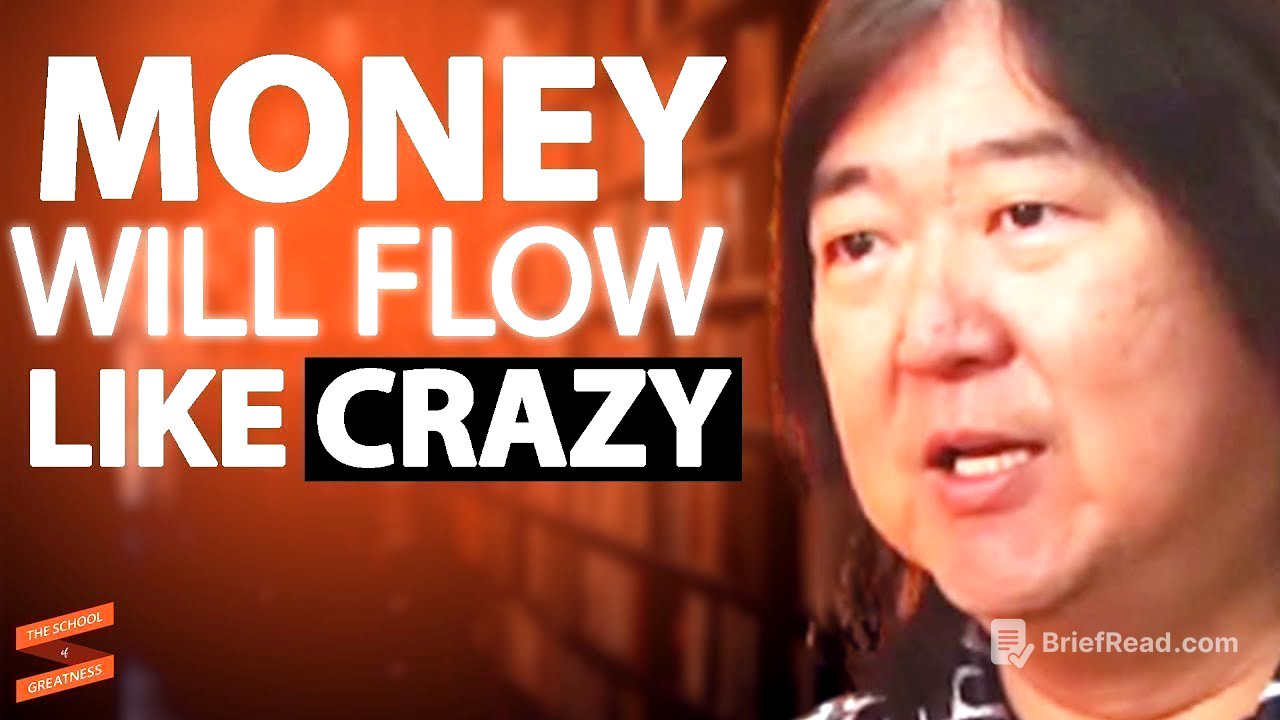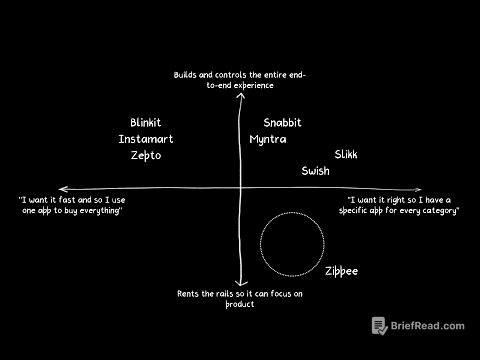TLDR;
Alright, so this video is all about changing your mindset around money, innit? Ken Honda shares some amazing tips on how to find peace with your finances, no matter what's happening in the world. He talks about how important it is to focus on your invisible assets like friendships and kindness, instead of just chasing the next big paycheck.
- Money is energy, and you gotta let it flow.
- Focus on your invisible assets like friendships, trust, and kindness.
- Be kind and generous, especially when times are tough.
Affirmations for Peace of Mind [0:13]
Ken suggests using positive affirmations to ease money stress. Saying things like "Money is love" or "Money is my friend" can help change your perspective. To make these affirmations work, you gotta look back at your relationship with money since you were a kid. Remember the good times, like that awesome birthday gift or the scholarship you got. These happy memories can balance out the negative messages we often hear about money.
Cultural Differences in Talking About Money [3:12]
In Japan and China, people are way more open about discussing salaries and finances than in North America. This openness can make money less of a taboo and easier to deal with. In North America, people often tie their self-worth to their net worth, which creates a lot of stress. But in Japan, things like having good friends and respecting teachers are valued more than just how much money you have.
Money and Relationships [5:52]
Even in Japan, couples fight about money, but surprisingly, women often control the finances. Ken points out that in North America, money is such a taboo topic that couples often avoid discussing it until there's a major blow-up. He stresses the importance of talking about money openly and honestly in relationships to avoid future problems.
Unworthiness and the Pursuit of Wealth [9:18]
A big reason people struggle with money is that they feel unworthy of abundance. It doesn't matter how much you make if your expenses keep rising to match it. Ken advises learning to be content with less and focusing on contributing to the world. By serving others with your gifts, you can create a flow of "happy money."
The Money Container Size [11:04]
Ken introduces the idea of a "money container size," suggesting that we're each born with a certain capacity for wealth. Some people are happy with less, while others are driven to accumulate more. He emphasizes that it's important to know yourself and your needs, and not just blindly chase wealth.
Invisible Assets [12:39]
Ken talks about the importance of "invisible assets" like friendship, trust, happiness, and kindness. These things are way more valuable than money. He shares a story about depending on the generosity of Americans when he was 19, highlighting the power of human connection.
Investing in Yourself and Others [15:13]
Instead of focusing solely on financial investments, Ken suggests investing in yourself by building credibility and strong relationships. He shares his own experience of giving away a booklet for free to millions of people, which created a sense of trust and loyalty.
Preparing for Economic Uncertainty [25:04]
With economic uncertainty looming, Ken advises against get-rich-quick schemes. He suggests focusing on building invisible assets like strong connections and a good reputation. He believes that even if you lose everything, you can start over with the support of your friends and community.
Three Steps to Prepare for the Future [34:03]
Ken outlines three steps to prepare for the future: find your peace of mind by appreciating what you have, figure out your inventory of assets and gifts, and start getting support from the people around you. He envisions a future where people support each other, creating a safety net of love and trust.
Financial Goals and Imaginary Joint Accounts [39:23]
Ken doesn't think financial goals are necessary for everyone. Instead, he suggests imagining a joint account with a wealthy mentor like Warren Buffett. This can give you a sense of security and support. He emphasizes the importance of living your life's purpose, which will naturally attract support from others.
The Money Magnet Concept [42:39]
Ken discusses the concept of being a "money magnet." He explains that everyone has a reserved seat in life, and you need to find it. To find your seat, listen to your heart and pursue what excites you. He suggests taking a few minutes each day to check in with yourself and listen to your heart's guidance.
Affirmations and Subconscious Thoughts [47:15]
Ken emphasizes the power of daily affirmations. Even if you don't believe in them, you're constantly saying things to yourself subconsciously. He suggests writing down your subconscious thoughts and identifying the negative ones. Then, you can consciously choose to replace them with positive thoughts.
Money as Energy and the Importance of Trust [48:49]
Ken explains that money is energy, and you need to let it flow. Hoarding money can lead to problems. He stresses the importance of trust – trusting that when you let go of money, it will come back. He suggests thanking your money and blessing the world as you spend it.
Balancing Saving and Spending [51:39]
Ken discusses the importance of balancing saving and spending. He gives different prescriptions to his clients based on their tendencies. For savers, he might suggest spending a certain amount of money on something frivolous. For spenders, he might suggest saving more.
The Attachment to Money [54:31]
Ken shares that people who are overly attached to money often have physical problems like constipation. He explains that letting go of money easily allows more opportunities to come your way. He encourages people to think of spending money as shopping for memories.
Speaking Positively About Money [57:19]
Ken emphasizes the importance of speaking positively about money. He suggests thinking of money as a person and asking yourself if money loves you as much as you love it. He encourages people to respect their money and treat it like a best friend.
Asking Money Where It Wants to Go [58:42]
Ken shares a unique practice of asking his money where it wants to go. He tells a story about receiving a check and feeling that the money wanted to go to a Cambodian orphanage. He believes that by asking money where it wants to go, it goes to the right place to bless others.
Missing Out on the Fun [1:00:58]
Ken believes that people who hoard money and don't spend it are missing out on the most fun. He shares a story about his mentor donating a large sum of money to a children's hospital while he was still alive, so he could see the impact of his generosity.
Ken's Vision for His Money Life [1:02:37]
Ken reveals that he's "money indifferent" and not interested in growing his wealth. His vision is for humanity to be free from money worries. He encourages viewers to think about what they would do if they didn't have to worry about money.
Lessons for Parents to Teach Their Children About Money [1:04:12]
Ken shares three lessons that parents should teach their children about money: money is fun and can make people happy, learn about money and emotions, and give more to receive more. He emphasizes the importance of relationships and following your heart.
Sex and Money [1:11:56]
Ken discusses the connection between sex and money, explaining that they both can bring out the best and worst in people. He believes that healing your relationship with money can heal other areas of your life.
Ken's Biggest Challenge [1:17:51]
Ken shares that his biggest challenge is his "false humbleness," which leads him to be content with a small happiness. He acknowledges that he can contribute more to the world.
Ken's Three Truths [1:20:09]
Ken shares his three truths: life can be fun, when you wonder, jump, and enjoy every moment.
Saying Thank You [1:22:44]
Ken emphasizes the importance of saying thank you when you receive and when you pay. He explains that every bill represents the work of many people, and by saying thank you, you're acknowledging their service.
Reprogramming Our Minds for a Healthier Relationship with Money [1:29:48]
Ken believes that the key to reprogramming your mind is to be clear about what you need money for. He emphasizes that money comes after what you give out to the world. He encourages people to focus on their curiosity and passion, and the money will follow.
The Path to Happy and Wealthy [1:34:23]
Ken believes that the only way to be happy and wealthy is to aim for happiness first. He shares a story about two florists, one focused on cutting costs and the other focused on providing the best flowers. He believes that the florist who loves flowers will ultimately succeed.





![Notion Tutorial - Full Course for Beginners [2025]](https://wm-img.halpindev.com/p-briefread_c-10_b-10/urlb/aHR0cDovL2ltZy55b3V0dWJlLmNvbS92aS9rT2YzUVNCVjI5WS9ocWRlZmF1bHQuanBn.jpg)



